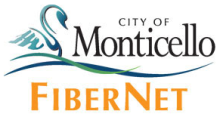Monticello Fiber Price War Offers Key Lessons for Broadband Competition
Monticello Minnesota may be located 40 miles outside Minneapolis, but it is the center of the planet when it comes to FTTH competition. We have tried and cannot identify another community localed on planet earth with two separate FTTH networks going head to head across the entire community.
We have long written about Monticello, most recently to look at hypocritical criticism of the project (which gives me an opportunity to note a similar dynamic in Lafayette, Louisiana). And we have covered the disappointing news that the network has not produced enough revenue to make full bond payments.
Short explanation for how Monticello came to be unique in having two FTTH networks: Monticello had poor Internet access from Charter and telephone company TDS. Each refused to invest after local businesses and elected officials implored for better networks. Monticello started building its own FTTH network (Monticello FiberNet) and TDS sued to stop the project while suddenly decided to upgrade its slow DSL to fiber. Lawsuit was tossed out and Monticello finished its network.
In most community fiber networks, the DSL provider seems to fade away because it cannot offer the fast speeds of fiber or cable, so the market basically remains a duopoly with the community network replacing the telephone company (which continues to offer cheap, slow DSL to a small number of customers). But in Monticello, Charter and TDS engaged in a price war, which has really hurt the City's ability to generate enough revenue to pay its debt.
Price wars are very hard on new market entrants because they have to amoritze the cost of their investment whereas the incumbents often have already done so. This means incumbents can almost always offer lower prices if they are determined to do so.
In many communities, we have lacked clear evidence of predatory pricing - that is pricing below the actual cost of service to run competitors out of business. This would violate federal law (if any agency bothered to enforce it).



